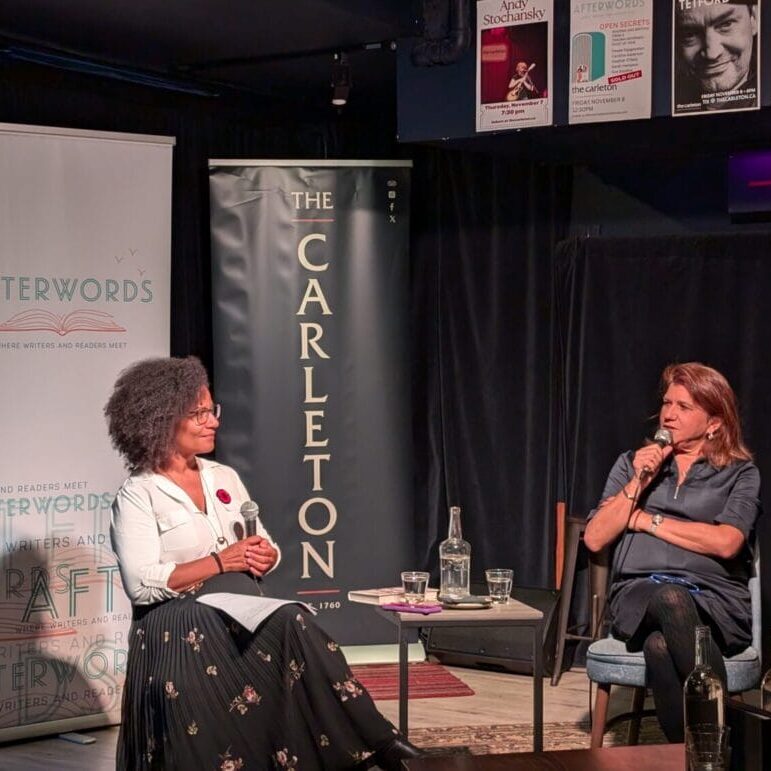
A glimpse into Afterwords Literary Festival 2024
From Nov 2-10, the festival returned to Halifax for its sixth year
Book lovers and storytellers from across Nova Scotia came together from Nov. 2-10, as Afterwords Literary Festival returned to Halifax for its sixth year. The festival hosted a number of literary events across the city, featuring over 50 Nova Scotian writers across various talks, workshops and panel discussions.
The Dalhousie Gazette attended multiple festival events to offer readers an insider’s view of Halifax’s premier literary celebration.
A Mother Apart
On Nov. 4, Carbon Arc Cinema, in collaboration with Afterwords, screened A Mother Apart (2024), a documentary directed by Toronto-based filmmaker Laurie Townshend. Through a combination of interviews, animation and electrifying spoken word, A Mother Apart tells the story of artist and activist Staceyann Chin and her relationship with motherhood, exploring her roles as both a mother and daughter.
Chin spent the last five decades pursuing a relationship with her mother, Hazel, who left her in Jamaica as a baby to start a new life in Canada. Chin’s longing to connect with her mother clashes with her resentment over being abandoned in a way that is both confusing and entirely human. The audience connects with Chin through the authentic portrayal of Chin’s emotions and experiences.
Townshend’s film is simultaneously heartbreaking and healing, offering insight to our relationships with our parents, our children and, ultimately, ourselves. A Mother Apart is a must-watch for anyone struggling with being a parent or being the child of a parent.
Long Story Short
On Nov. 7, Afterwords welcomed writers and readers out of the cold November air and into The Bus Stop Theatre for an evening of stories and conversation.
The night began with Halifax author Elliott Gish, reading from her debut novel, Grey Dog. In an excerpt interspersed with definitions taken right from the dictionary, Gish explores the unknown and the undefined, capturing the simultaneous intrigue and fear it creates within us.
Fawn Parker followed, reading from her new novel Hi, It’s Me. Her rhythmic reading of the text commanded attention, and the vivid descriptions painted the setting in front of the audience.
The last reading, before a quick break, came from Deepa Rajagopalan and her short story collection, Peacocks of Instagram. Rajagopalan spoke of the immigrant experience, the sometimes overwhelming distance between peers and the intersection of the new and the old. Her writing connects to universal feelings, while also asking readers to consider personal experiences of their own.
The final event of the evening was a conversation between Caroline Adderson and Alexander MacLeod, centred on Adderson’s short story collection, A Way to Be Happy. In a lively and engaging conversation, the two discussed Adderson’s use of intertextuality as a creative challenge, explored connections to Halifax’s ongoing housing crisis, and more — all illustrated through selected passages from A Way to Be Happy. Gish, Parker, Rajagopalan and Adderson displayed their talents as both writers and readers, drawing audiences in with their wonderful delivery of their words.
Sunday Afternoon at The Carleton
On Nov. 10, journalist Elizabeth Renzetti took part in a conversation at The Carleton with CBC Radio host Portia Clark. As an opinion and feature writer for The Globe and Mail, Renzetti shares her passion for equality issues, often focusing on women and girls, using her voice to support those without one.
The discussion touched on topics such as the patriarchy, the United States election results and intimate partner violence. Renzetti spoke about the three femicides in Nova Scotia in the past month — and the broader issue across Canada.
“Those three femicides, I read about them, and I was horrified and shocked. I think it’s almost 140 women, or girls, who have been killed by violence in 2024 — more than the year before. The number keeps rising,” said Renzetti. “We have no idea how huge this epidemic is, and it is an epidemic. Not that you’d know if you lived in Ontario because they refuse to declare it an epidemic, although it would cost them nothing.”
Touching on oppressive systems and the United States election, Renzetti shared her thoughts on how these systems become widely accepted.
“It’s false consciousness, isn’t it? It’s really this idea that — and it’s pernicious in America — it’s deep-seated. The idea is that as an individual, you can transcend whatever crappy things happen to you, whatever your corporate owners do to you, however much they squash you, and you too can rise to become a mighty titan like Donald Trump, completely setting aside that he was already born on third base.”Renzetti’s lived experiences through her work and life are explored in her book, What She Said: Conversations about Equality.






